#like THIS IS JUST OBJECTIVELY FACTUALLY WRONG
Text
love the internet bc you can see people with the worst takes. hate the internet bc it is almost impossible to convince them otherwise.
#this is about matt walsh and jk rowling#like THIS IS JUST OBJECTIVELY FACTUALLY WRONG#please give me rights mr walsh uwu#/j /j /j#internet culture#like. sometimes i love the burning rage i feel when i see 'christians are inherently homophobic' you know?#but then other times it makes me sad bc#the only homophobia (TECHNICALLY it's biphobia) i have is the internalised shit
3 notes
·
View notes
Text
people will dislike something and instead of just being like “hey it’s not for me,” they’ll just lie about why it’s bad
#read some of the craziest only friends takes that we’re just objectively wrong#and not in a ‘your opinion is wrong’ way in a like factually if you thought about that for two seconds you’d realize that’s not true#liz rambles
24 notes
·
View notes
Text
Just got a rundown of the Batcat War issue or opening salvo or whatever and I fucking object to this Dick Grayson characterization so fucking much who do I have to pay to break the fourth wall in the opposite direction and kidnap him to rescue him from this terrible storyline oh god Taylor's gonna write tie-in issues to this mess, isn't he. ISN'T HE.
#fahklfhlkahflkahflkafhlkfahlk#i hate this so much#Selina is like objectively factually right here#but god forbid the circus kid be allowed to be the one to point out that there absolutely#literally IS a difference between desperate poverty-driven criminals targeting#a local bodega store owner vs a one percenter#THESE THINGS ARE NOT AT ALL EQUIVALENT#DICK GRAYSON MY BELOVED YOU ARE ON THE WRONG SIDE#like Dick's parents LITERALLY died because of an extortion scheme#he understands the difference between traditional organized crime#and how it impacts the lower classes#and what Selina's talking about here#what if Dick's characterization got to be driven by his own backstory instead of just writers#being like this is Bruce Stan Number One#he doesnt have his own thoughts or experiences#just watered down versions of Bruce's#WHAT IF
16 notes
·
View notes
Text
The chat ais can’t lie y’all, the same way they can’t tell the truth. They’re just guessing what probably comes next. It’s more like a getting a math problem wrong than intentional mistruth.
#not to say that isn’t dangerous in it’s own way#working with GenAI rn is weird#also it only knows what you tell it#so like if you ask about a topic it doesn’t know about but it either isn’t trained to or#doesn’t realize it should admit it does not know and will just spew out factually wrong answers#Plus natural human biases are in that training data which can impact how the bots react#but yeah it doesn’t have a sense of objective truth the way a couicious being does#genai#computer science#rambles
3 notes
·
View notes
Text
Satine Kryze should not be a sympathetic character.
A complex and tragic one? Sure. Every day of the week.
But she did not 'have a point', neither in-universe, not outside of the sw framework. She isn't a hero, neither of her own story, nor of someone else's. There is no way she wasn't a tool. You should not look at her and think 'this woman has done nothing wrong and what ultimately happened to Mandalore was to no part her fault'.
Because guys. Friends. Strangers on the interwebs.
Pacifism doesn't work.
And it certainly wouldn't have worked in motherfucking Star Wars – the 'wars' is literally in the title – for a system or series of systems who wanted to stay neutral.
YOU DON'T STAY NEUTRAL FOR LONG BY JUST SAYING 'YEAH, NO THANKS <3' TO A LARGE-SCALE CONFLICT.
source: I am Swiss, we've looked at this in history class. Extensively.
Satine was a dreamer (thanks Obi-Wan) who was allowed to keep her delusions because they actively benefitted Palpatine's plans. And that's something you can quote me on. There is literally no other reason (apart from supremely bad writing but we'll leave that aside here) for her and her little friends' 'Alliance of Neutral Systems' or whatever to be allowed to exist.
Not that they were neutral in any way, shape or form, by the way.
So yeah sorry to the Satine stans, but you're idolizing a character that was written exclusively and specifically for Obi-Wan's manpain and who, in-universe, was a supremely bad politician. Because the level of mental dissonace needed to factually be a Republic System, have a seat in the fucking Republic Senate, rely upon their military for aid while actively proclaiming that All Violence Is Bad And Barbaric one sentence later AND THEN CLAIM TO BE NEUTRAL IN THE WHOLE CONFLICT – it's just mind-blowing. Even moreso that people actually look at this character and see something aspirational in her.
Again, I'll gladly dissect her character any day of the week. She is fascinating because of all the implications her existence as a head of state carries with it, as well as her deeply complicated family history and her relation to mandalorian culture.
But it just grates on me personally that that all gets ignored in favor of her being some sort of icon of white american saviorism (bc that's literally what she is) and her objectively bad political takes being treated like they are the only correct stance to be taken during the Clone Wars/Mandalorian Civil Wars.
If you think pacifism works and actually lets you stay neutral, I desperately urge you to open a history book. Because those two are mutually exclusive. Especially in the scenario that Star Wars paints.
#you know i would have LOVED actual neutrality be explored in sw canon#but noooo#we got satine and her judgmental draft dodger club#give me neutral systems that ARENT having a happy fun time#that are shooting down republic and seperatist crafts alike when they cross their borders#that are struggling to stay self-sufficient during the wars and that have to make questionable deals with both sides to afford supplies#you know. things based in reality#there is no moral way to wage war#and there is no moral way to stay out of it#its a lose lose situation and i WISH tcw had treated this as such#random boli thoughts#just some meta ramblings to satisfy the blood demons#satine kryze critical#satine kryze#like. before you tell me i'm wrong name ONE single reason that the separatists had for not immediately annexing mandalore#or the 'neutral' systems in general#you dont stay neutral by just saying 'not my business'#you stay neutral by being too fucking annoying to annex#that is literally the only way#star wars#star wars meta
501 notes
·
View notes
Text
Since Wisdom Saga dropped, I've been reading multiple reactions to the portrayal of Zeus in God Games and what bothers me isn't just that Jorge went with the narrative of making Zeus the villain (which he is not) but rather that there's a significant chunk of myth enjoying audience that willingly went with that plot without objection.
Which should be concerning.
Zeus is a complicated phenomenon of antiquity. People who claim that "he's just a cheater", "he's just a serial rapist", "he's just a bitch" are all wrong in various ways and these arguments betray saddening lack of familiarity with the source/ancient cultures as well as hard divorce from nuance. It's okay to have personal opinions and it's good when they differ between people but it's unfortunate when a factually wrong conclusion is distributed as a genuine point of myth discussion by people who are supposedly familiar with the topic.
There are multiple reasons why I'm pissed off by the villainization of Zeus we have to endure yet again and all of them can be defined by an umbrella statement of "this is further cementing a biased and mistaken stereotype and simplifying the conflict of Homeric texts."
I rarely imply "read the fucking book" because one shouldn't have to be deeply familiar with one source in order to enjoy another, but the issue is that people — even after Jorge's fair warning — take portrayal of Zeus within the musical as the projection of mythical Zeus which couldn't be father from the truth.
P. S. I like Epic, I just don't like non-critical approach and projection of some of its fans. Don't use my post as a gateway to aim hate at Jorge and his team.
155 notes
·
View notes
Text
Why Aziraphale is an unreliable narrator
Part 2: The Story of wee Morag
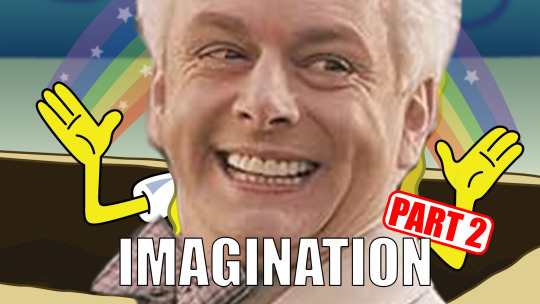
This is Part 2 of 3 total metas. Here are:
Part 1, in case you want to read about my analysis of the Story of Job first
and Part 3, in case you're impatient and want to jump ahead.
Fair warning though, for the sake of understanding some of the references, you're probably better off reading this chaptered meta chronologically. However, every part should work just as well as a standalone! I'll do my very best to make it so.
Alright, off or on you go beyond the cutty cut!
I'll start this second part off with a very brief summary of the main take aways and points from Part 1, which go as such:
Memory, as opposed to a third party's narration, is not a factual, objective retelling of a story or event. It's mingled and mangled with emotions, imaginations and exaggerations, projecting both the feelings and impressions you had back then as well as those you might have now in the present time back on whatever it is you are remembering. (Which is why we need to put everything that Aziraphale is remembering into the context of what he might have felt in the past, as well as what he's feeling right now.)
While this doesn't mean his (or anyone's) memories are lies, it does mean they're a very subjective and sometimes factually distorted representation of what actually happened, which, in our case, gives us a lot of subtext and a lot of not-there furniture to figure out and look at.
So, let's continue with S2E3 and the Story of wee Morag. We start our flashback with a scene of Aziraphale writing his diary entry on the 10th of November, 1827. Immediately, it's firmly established that this is once again not an outside-point-of-view narration, but rather what Aziraphale remembers and wrote down.
One thing that immediately stuck out to me here, is how helpful and kind Crowley is to Elspeth, pretty much from the very beginning when they meet her in the graveyard. Not only does he take on a Scottish accent so she won't perceive him as English (as she does with Aziraphale), but he also helps her drag the barrel that has the fresh body in it and, in the end, even pulls it all by himself while Elspeth simply follows behind them. Here's a rather poor-quality picture, for reference:

Now, we know that despite not showing it very often, Crowley has always been very fond of the humans and never really put himself on a pedestal simply because he's an immortal being himself. He likes humans, just like Aziraphale does. But, just like this story will tell us, Crowley knows that on top of liking humans, you can't just put them into boxes of good and evil and expect them to always do what is supposedly the "right" or "divinely good" thing to do. (Which is what differentiates him from Aziraphale in the way he understands and treats them, as we're shown in this minisode).
Him immediately and unspokenly helping Elspeth with dragging the barrel therefore might also be a first sign of a tiny projection from present day Aziraphale, as opposed to what Crowley might have actually done (probably just walked beside her, like Aziraphale) because he has the knowledge that Crowley really was so very kind to her in the end, wasn't he? And that he's kind to humans in general. ("Not kind! Off my head on Laudanum!" Sure, babe.)
Most of this minisode, in my opinion, is actually there to establish how Aziraphale's view of morality and good vs. evil used to be quite flawed and elitist –– and how Crowley has always been there to gently nudge him towards questioning his black and white view of heavenly right and hellishly wrong. That's why I think there's not as many hints in this minisode about Aziraphale's memories not being an accurate portrayal of what happened, as there are in the Story of Job or the magic show in 1941. (And, fear not, the latter will definitely be the most hint-heavy one). Alas, there's still a few bits and bobs in the Story of wee Morag that stuck out to me, that make a brief yet good case of the whole unreliable narration thing.
First of all: The way Aziraphale describes all of it in his diary is so different from the way we see him actually remembering it. It's almost like he tried to write this entry (and possibly all of his diary) as a bit of a thrilling short story, with himself as the main character. Which makes sense, given the fact that he adores books and would certainly be keen on dabbling in the art of capital-w Writing himself. It's yet again hinting at the fact that sometimes people (and angels) try to polish and bedazzle stories (and memories) to make them seem more exciting and adventurous, often to distract from the not-so-fun parts of it.
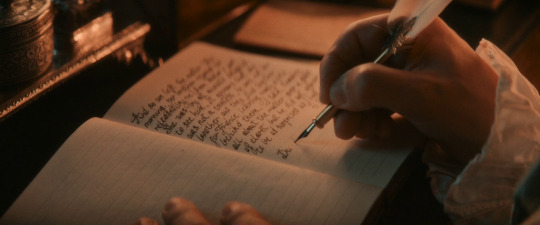
Like when Aziraphale's diary narrates:
"It was with heavy heart we arrived at Elspeth's destination. I was determined to thwart her monstrous plan!"
... and yet we see Crowley and Elspeth casually walking down the alleyway, very obviously not heavy-hearted in the slightest, while Aziraphale nervously scurries on behind them, very obviously not determined to thwart. (Timestamp-wise, it's around 17:38 in S2E3, in case you want to see for yourself.)
We get another cinematographic/auditory hint at the fact that Aziraphale's memory is heavily influenced by what he's feeling that very moment, when Dr. Mister Dalrymple –– FRCSE, thank you very much –– shows him the tumor he removed from the seven year old boy. You can see the shock and horror on Aziraphale's face once he learns of this child's cruel fate. We then proceed to hear Mr. Dalrymple's voice grow sort of echo-y and far away as the sad music swells up and drowns out his voice almost completely. It's awfully similar to what it feels like when really horrible news are broken to you and you dissociate and drift into a state of shock. Here's the clip of it, so you may listen for yourself:
It's clear that this is a very subjective portrayal of what Aziraphale is going through during this part of the memory. He's deeply horrified and saddened about the little boy having passed away so early in life – and we hear and feel this shock with him. Through him, because this is his memory. Whatever it is he's feeling and thinking, we're feeling and thinking it too because we're seeing it through his lense.
Another (less sad) hint at a possible exaggeration is the abnormally deep hole Crowley makes the two graveyard watch keepers fall into. I'm pretty sure he's very much in charge of his miracles, making this random slip-up seem a little silly – which is why I'm also pretty sure the "Might have slightly overdone it on that hole" is a wee bit of a meta hint at this just being another one of Aziraphale's dramatic bedazzlements of this story. For the *flings feather boa around neck* drama!
You know what else might be exaggerated? Hm, I dunno, maybe Crowley growing into the size of a tree for no apparent reason. Sure, yes, he's pretty high on Laudanum which is making him a bit loopy. But apart from that, it does seem an awfully big cinematographic euphemism for him being the metaphorical (and, once again, for the drama of it) literal bigger person in this scenario. He's the one who ends up saving Elspeth and who manages to secure a safe life without poverty and grave robbing for her. While Aziraphale was so tangled up in his own moral journey and main character-ism, missing that wee Morag was seconds away from death already, Crowley is the one who actually ends up growing stepping up for the human in need and saving them for good (pun intended).
In a way, it might just be Aziraphale's view of/feelings for Crowley in this very moment. Watching the demon outgrow what, according to Aziraphale's heavenly logic, is supposed to be a foul fiend, bestowing evil upon humanity – and growing into someone who does the exact opposite and saves Elspeth instead. Another larger-than-life character development, in Aziraphale's eyes. Literally.
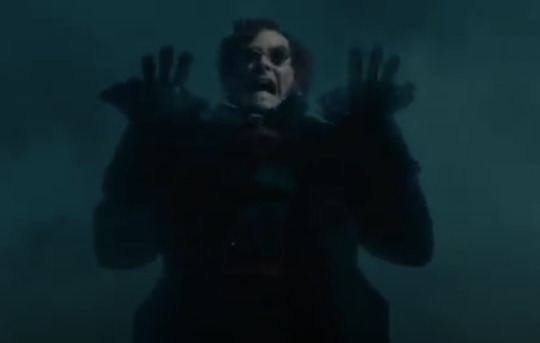
Let's switch back to the topic of the diary entry one last time, so I can make my final point of the this minisode's unreliable and a smidge over-dramatic narration of Dr. McFell. If you pay close attention, Aziraphale starts the entry we're all getting to experience with: "Last month, Crowley and I both happened to be in Edinburgh." Which means it didn't actually happen on the 10th of November, but rather at some point in October, 1827. Once we see Crowley get hydro-pumped back to Hell after rescuing Elspeth, the minisode ends with, presumably, the last sentence of Aziraphale's diary entry: "And that was the last I would see of Crowley for quite some time."
Take my hand and let's look at where the furniture isn't: This very clearly means that Crowley couldn't have been gone for more than a month, at best. Read again: "It happened last month and that was the last I would see of him for quite some time." This, albeit indirectly, clearly implies that when Aziraphale had sat down to write the diary entry, he had already run into Crowley again. Otherwise his phrasing would have probably been more along the lines of "... and I haven't seen Crowley since" or "... and Crowley has yet to return from wherever it is Hell's currently keeping him".
What's the point I'm trying to make? Good question. I guess my main point of storyteller Aziraphale being a bit over-dramatic in his narration is simply backed up by this, since A Single Month would barely pass as "quite some time" for an immortal being like him. And yet that's how he puts it, in his little Confidential Journals of A.Z. Fell, Vol. 603.
And another point that has absolutely nothing to do with the topic of this meta (but I'm still gonna make it 'cause this is my memory post): The meeting at St. Jame's Park in 1862 that so many, post-S2, took to be their first run-in after the Story of wee Morag, actually wasn't that at all. They saw each other at least once only a month later, as Aziraphale's diary lets us know. Which explains why he wasn't very surprised or concerned when he met Crowley in London, 1862. If there really had been 35 years in between those two events, the first one ending with Crowley being sucked back Downstairs to receive more than three decades worth of hellish punishment, wouldn't Aziraphale have been at least a tiny bit worried or more interested than:
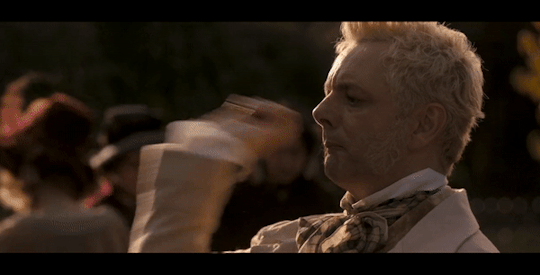
Just saying.
Alright, let's string this inflated hot air balloon of a post back together so we can outline some invisible furniture. This time with only two humble points:
Crowley through Aziraphale's lense
Backed up by how we are introduced to Bildad the Shuhite in the Job minisode (suave, cheeky, smart, passionate in shoemaking and obstetrics), it's growing quite clear that Aziraphale's memories and impressions of Crowley are very fond and impressed ones. He sees him as someone who's not only witty, funny and cool, but also as someone who has figured out way sooner and faster than him that nothing's ever black and white. Not God's plans and not the human's choices either.
Aziraphale as a bit of an exaggerating adventure author
With the direct parallel we get of inkslinger journalist!Aziraphale in the present day, it's quite apparent after this minisode that Aziraphale's memory is not only deeply influenced by his emotions, but that he also tends to have a bit of a dramatic touch to him. Although, you gotta give it to the guy: A month without seeing the love of your life, even if said life is eternal, can indeed seem like "quite some time".
Well, would you lookie here, we've reached the end of Part 2! What a journey it was. I hope you forgive me for the fact that I drifted off-course a few times. I just can't seem to reel in my silly little observations, even if they've got nothing to do with the point I'm trying to make. But hey, doesn't that just make me a little bit like Aziraphale's storytelling, in a way?
I'll let you be the judge of that.
See you in Part 3! And in case you haven't snuck a peak yet: here's Part 1 again.
Ta!
#good omens#good omens season 2#gos2#go2#good omens 2#good omens meta#ineffable husbands#aziraphale#crowley#good omens analysis#aziraphale is a storyteller#but not a very accurate one#story of wee morag#my own meta#aziraphale the Drama Queen#shakespeare who#unreliable but beloved story teller aziraphale
562 notes
·
View notes
Text
"Any chance we're wrong about Covid?"
It's a valid question many people earnestly think about — even the very cautious.
'it becomes important to ask: "what does the data actually say?"'
Quoting a few good answers from a thread:
"Covid left me disabled in 2020. I know with 100% certainty that I am not wrong about Covid. I live with the proof every minute of every day for the rest of my life."
"The insurance companies and government statisticians care, or rather they have taken an objective interest." > https://fred.stlouisfed.org/series/LNU01074597 > https://insurancenewsnet.com/innarticle/insurance-industry-coalition-forms-non-profit-to-study-excess-mortality
"There are parallels between how governments are responding to COVID-19 and how they responded to tobacco back in the day.
“it would be a mistake to assume governments would automatically protect people from a public health threat in the face of more immediate economic considerations…there would be resistance to change that might be costly until evidence to justify it was overwhelming.”" > https://johnsnowproject.org/insights/merchants-of-doubt/
"I suspect most of us entertain this thought from time to time, especially when it’s this absurdly difficult and lonely to maintain a Covid Conscious lifestyle.
But it’s important to remember that history is littered with people making terrible choices en masse: with handling past pandemics, the holocaust, slavery, witch burnings, etc. Hell pretty much everyone used to smoke and putting lead in everything was A-ok. Just because a lot of people believe something doesn’t mean they’re right. So it becomes important to ask what does the data actually say?
The research and the statistical data on this subject paint an ugly but fairly quantifiable picture by which we can gauge our understanding of the situation and our choices in response to it. Read the science. Look at the data on things like Long Covid. There are also many of us who have already had our health absolutely ravaged by this virus or lost loved ones to it etc., and everyone in that position has first hand evidence for how dangerous this virus is.
It’s tremendously difficult to swim against the current like we are and self-doubt is natural in those conditions, but that’s when seeking out factual information on the subject is the best course of action."
"But what it all comes back to for me is - say we're wrong, and covid is a big nothingburger and lockdowns are the root of all evil. Ok, well, what I'm doing is acting on the best information available to me at this time to protect my family. I can't regret that. I will always be able to look my kids in the eye and say "I did my best with what I had."" ...
So if we're wrong - well, we wore masks, changed our social habits, reduced our consumerism and our contribution to the destruction of our planet, and reduced how often we got sick. None of those things are bad. If they're wrong, they and their kids are screwed. I'd rather err on the side of caution.
121 notes
·
View notes
Text
that poll didn't ask if it was morally wrong to masturbate in someone else's home as a guest it asked if it was rude which is like objectively yes. I feel like that can be considered an implicit rule please do not masturbate on my furniture like it's just something I would assume one would feel secretive about doing because they know it's sort of just rude to be doing that. I saw a post the other day where a bunch of people told stories about accidentally breaking something in their friend's house as if they were all funny and ridiculous unexpected bad luck accidents when it's really like well why the hell are you throwing things around in another person's home in the first place... did you people not have parents growing up to teach you these things. and the poll asking if it's rude to have sex in someone else's home with someone who doesn't live there oh you people are crazy it didn't ask if it was morally or even socially acceptable to do I'm pretty sure that's just disrespectful and against unwritten "guest in someone's home" rules like factually...
96 notes
·
View notes
Text

I always see this brought up as if it's a sick diss, but it's really not. And it's not because:
It's factually wrong, something Frye would know if she knew anything about her opponents beforehand. A member of the band by definition can't be a groupie. Frye's clowning on herself.
Pearl & Marina both demonstrate how she's wrong in the next beat.
It's not even a diss to Pearl. It's a diss to Marina and a COMPLIMENT to Pearl. Frye is saying that Marina is a.) not part of the band, b.) just following Pearl to get in her panties, and c.) Pearl is therefore hot enough to have someone following her to want to get in her panties. It completely fails in Frye's objective of beating Pearl in the rap battle because she's targeting someone she wasn't battling and, in so doing, compliments the one she WAS battling. (And perhaps lowkey disses herself, because if Frye herself doesn't have a groupie, what does that say about how hot she is?)
I think people got distracted by how not-Nintendo-friendly Frye using the word "groupie/grouper" was and forgot to look at the broader context of the rap battle / what Frye was actually saying. Frye was dissing Marina, whom she wasn't battling, and in turn complimenting Pearl by saying Pearl is so hot that Marina — a smokin' hottie herself — is only there to get in Pearl's panties.
(Of course, Pearl wasn't going to let Marina be dissed like that even if it was a compliment to her, hence the "as if!" and demonstration of Marina's voice so fine, but nonetheless.)
I love Frye, but this was not a winning bar. Girl lit herself on fire here. It was a good demonstration of why you shouldn't pick a rap battle with MC Princess.
#splatoon#frye onaga#pearl houzuki#pearlina#talentless uggos don't get groupies ykwim?#frye wasn't thinking that one through
128 notes
·
View notes
Text
I always get a little annoyed at posts saying “btw did you know conservatives don’t know what they’re talking about? did you know that they’re incorrect about x?”. And it’s not because that’s wrong per se (conservatives don’t know what they’re talking about and they’re almost always factually incorrect, which is a significant part of why their politics are awful), but focusing on the factual substance of their claims tends to obscure the reason why they’re being incorrect in the first place. like yes they sound ridiculous when they say “I don’t believe in pronouns” but its not because they don’t understand how grammar works. The purpose of that statement is to argue that gender should not be negotiable through language, that to use “pronouns” is to attempt to alter someone’s god-given ontological gender and is therefore morally wrong. And because this discussion is dominated by English-speakers (gendered pronouns are not universal) living in imperial countries, a deeper claim is being made, that trans people are perverting the most enlightened language, the language of the West, the language that dominates all others. This also very neatly fits into right wing antisemitic conspiracies about the oncoming death of western civilisation, which is not an accident!
So conservatives are latching onto a word that has been recently infused with fresh political meaning in public discourse and using it as a rhetorical platform to be disgusting. They know how language works - language is contestable, it is both subject to constant change and a medium through which that change is negotiated. Trans people are making a claim (gender is partially mediated through language and therefore gender is reinforced and expressed linguistically) and conservatives are making a counter claim (no it isn’t). “I don’t believe in pronouns” is not an argument about the technical structure of language, it is an argument that trans people are so perverse that we infect and degrade the base components of language itself.
So yes, point out that they’re incorrect, but they aren’t incorrect because they’re stupid or ignorant, and being incorrect is not the primary problem with their rhetoric. That is a strategic statement which is deliberately inflammatory, can fit neatly inside both tweets and headlines, and makes a very grand conspiratorial claim about reality (any mention of pronouns is evidence of a transgender plot to destroy western civilisation and indoctrinate children), and this is all accomplished with a 5-word sentence that can be repeated ad nauseum. So the issue at hand isn’t a failure to observe the basic components of language, it’s a violent call to action to remove trans people from public discourse, and eventually public life entirely.
Conservatives are incorrect for a reason. They are incorrect on purpose because they don’t care what the truth is. They are politically savvy and incredibly successful at gaining and maintaining power. They know what they’re doing, and if your only critique of them is that they don’t have their facts straight, I think that’s just a really weak position to hold. What happens when they saying something factually correct? What happens when they know more than you? What happens when they’re well-spoken, well-read, and reasonable? What will you object to then?
590 notes
·
View notes
Note
Hello! I was wondering what you make of Seward's phrase "is it possible that love is all subjective or all objective?" I've seen people allude to different meanings on the phrase but I can't quite figure out what it means
I wanted to wait until after 11 October to answer this ask, just so I didn't have to spoiler for the context of my reply. Which is that... my instinct is to oppose Jonathan and Seward's loves for this one. Specifically, in their reactions to the women they love becoming vampires. (I'm choosing Jack specifically to talk about because we get in his head more than we do for the other suitors, though by actions one could argue they fall more on the same side as he does.)
Firstly, let's take a brief moment to talk about the specific words used. Subjective generally means dictated by personal taste, and objective would be based on fact or truth. So, a love that is all one or the other could be very different depending on what the person you love is like. For example, an objective love would appreciate someone's virtues, while a subjective one might find things to love even in their flaws. Or on a larger scale, and much more relevant to how the phrase is used in the book... what would happen when the person you love is becoming a vampire, a creature that is factually and objectively evil and wrong? How would you react, how would you feel?
It depends on your type of love.
Jonathan's love is all subjective. Even though he absolutely hates and despises vampires, once he knows Mina is at risk of becoming one he resolves to join her if need be. He sees her rejected by God when the communion wafer burns her forehead, and he says 'actually no, I think the holiest kind of love is the one that would lead me to join her in her unholy state'. Even when Mina outright appeals to him to kill her if she is too far gone - an appeal to his objective understanding, for him to express his love in a way that confronts the truth of what she would become - Jonathan remains silent and in doing so refuses to make that promise. It's implied that he would be willing to fight the other men in order to protect her, even though they are his allies and friends. His beliefs warp around the shape of his love. He will destroy himself and others for the sake of his love, even if he knows through painful experience how objectively evil vampires are.
Jack's love meanwhile is all objective. Even though he didn't fully understand what a vampire was, he began to lose his love for Lucy as soon as he saw her acting in that way. In fact every time she was acting out of character to be more vampiric before her death, he seemed to notice and be a little put off by it, even though he didn't really seem to realize so much at the time. He outright says this quote when he is watching vampire!Lucy and realizing that he doesn't feel as horrible about mutilating the body of the woman he loved as he would have expected. When he learns Lucy has become a monster, he begins to feel repulsed by her - a process completed when he sees her up close and outright says his love for her is gone: "At that moment the remnant of my love passed into hate and loathing; had she then to be killed, I could have done it with savage delight." His determination to destroy the Thing she now is completely separates her in his mind from her living self. His love gives way to the objective facts. He will help to kill her, and gladly, because what she has become disgusts him... because what she has become is objectively evil.
Obviously, their experiences are different, and perhaps it's not quite such a true binary. Mina's gradual transformation, combined with Jonathan's pre-existing knowledge, is quite different from Jack's abrupt introduction to Lucy's vastly changed self and to the idea of the supernatural at all. But for the purposes of examining this quote, I think it works quite well to set them up at opposite ends of that scale.
.
It's also kind of curious because it calls back to another great line of Seward's: "(Mem., under what circumstances would I not avoid the pit of hell?)" The context of that line is Seward struggling to resist his dark impulses with regards to his treatment of Renfield. And he says this after having noticed himself actively doing something he says he'd normally avoid like the pit of hell, so that means he was approaching it until he caught himself. This is a struggle he repeatedly faces with Renfield, finding himself longing for a cause that he would consider it worthwhile abandoning his morals for, so that he could just give in to these urges.
But while Jack Seward is the person most drawn to the darkness, as we get introduced to the vampires are representatives of the ultimate darkness he backs firmly away. It's only in isolation that he feels so attracted to amoral experimentation; when together with his friends he pulls himself back to be more firmly opposed. His treatment of Renfield is a mess the entire time, don't get me wrong. He never really does right by him. But he doesn't seem to feel that same urge to push him in such a cruel way merely for his own interest/satisfaction. It becomes in the service of a greater goal, the objectively good idea of fighting Dracula. (Again, not saying his methods are good, but his motivation shifts.) He's always been conscious of an idea of what is right to do and he actively tries to follow that, with much greater success when not left to his own devices.
Meanwhile Jonathan has never felt such an intense draw to the darkness. He survived months alone surrounded by evil influences, and it only increased his determination to remain himself/human. He hates the vampires and he feels no true allure to the idea of being like them (outside the allure everyone feels when being hypnotized by them, etc.). He wanted nothing more than a normal happy life, he never longed for a cause that would be worth throwing his morals away. And yet, when Mina begins to turn we see Jonathan decide that this is the circumstance under which he will not avoid the pit of hell. This is the cause he can dedicate himself to as fully as any madman. Jonathan never felt the need to philosophize about trying to avoid such things before he was exposed to them by others, because he has no inherent urge to seek them out. But he also lacks that restrictive hold when a reason does come along.
(To visualize: if there's a pit, then Jack is the person who keeps wandering closer, desperately wanting to lean over the edge and see what's inside. Knowing this about himself, he's tied a rope around his waist to ensure he doesn't slip too far. Jonathan never even went near until he abruptly decides to sprint up and swan-dive straight into it when he thinks Mina's fallen in.)
279 notes
·
View notes
Note
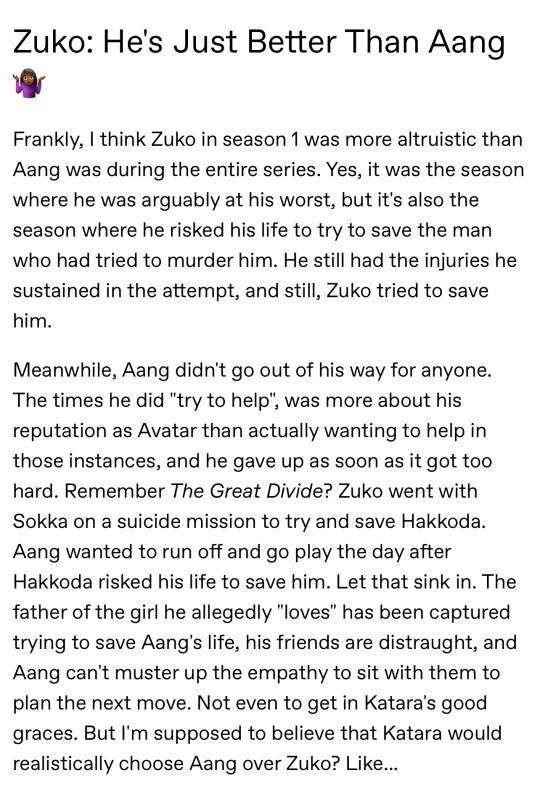
This has to quite possibly be the dumbest Anti-Aang I’ve seen on Tumblr. “Aang didn’t go out of his way for anyone”. Like that’s objectively wrong, factually incorrect. Like saying The Earth is flat, you can think it all you want, but it ain’t true. I ask you, I genuinely ask you, how can someone call themselves a fan of this show when they completely misinterpret it and hate the main character this much? This person’s crazy.
Aang never went out of his way for anyone? My god, if this take were true, Zuko would have been dead at the end of season one. Everyone aside from Aang was fine with the idea of allowing Zuko to freeze to death, leaving him to die. Aang was the one that saved him.
Holy shit, the first thing Aang ever offered to do with no expectation of anything in return was to offer Sokka and Katara a ride home before they died themselves stranded in the tundra. He then offered to take Katara to the other side of the world to fulfill her dreams. When he was banished from her village, he left without protest and even said he didn’t want to come between Katara and her family. Even when he was sad to leave because he had just made a first friend in who knows how long (seeing as we know he was ostracized at the temple), he still left.
He then came back not to break the banishment but to save their lives. He offered himself up, LITERALLY sacrificed himself for them, with no expectation of anything in return.
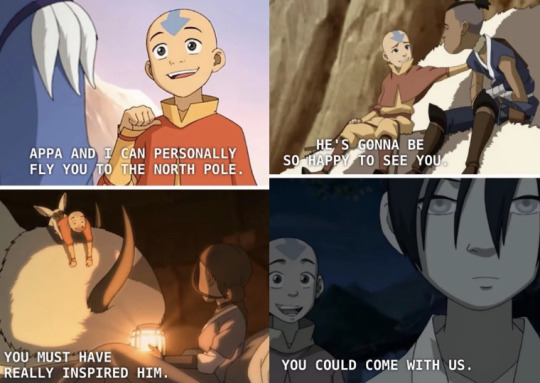
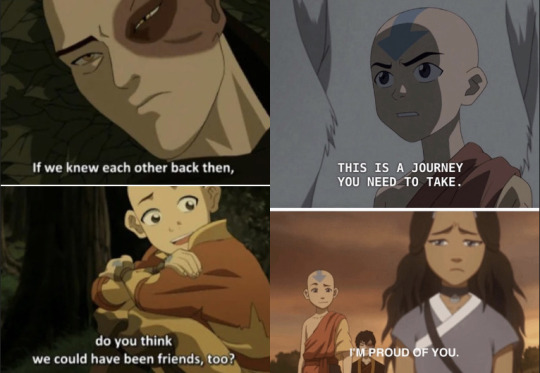
Aang is an extremely compassionate, good natured person. He is the most “altruistic” character in the show, followed only by Katara who comes nearly as close (one of the reasons they are so good together).
He singlehandedly put the fires out on Kyoshi Island that ZUKO SETS, he protects the NWT from invasion in every possible way he can and singlehandedly wipes out their fleet when he gives himself over to the ocean spirit, he demands they search for Bumi NOT because he needs a teacher but because bumi is his FRIEND! He saves everyone in the cave by making sure they don’t get fucking crushed with its collapse, he is willing to sacrifice himself and force himself into the Avatar State to win the war because he is that guilt ridden even when the AS is extremely painful and traumatizing to him, he stops this only when it affects Katara because he loves her, he offers to let Toph run away with them not because he wants to use her as a teacher but because he listened to her life story and wishes to help her feel free, he fucking dies for Katara and sacrificed his own love for her to save her life
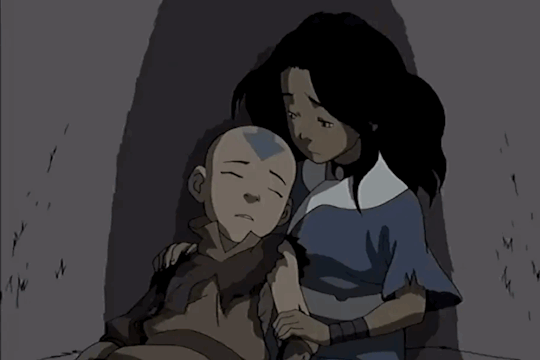
he tries to shoulder every burden he feels on his own as a means to protect the other characters
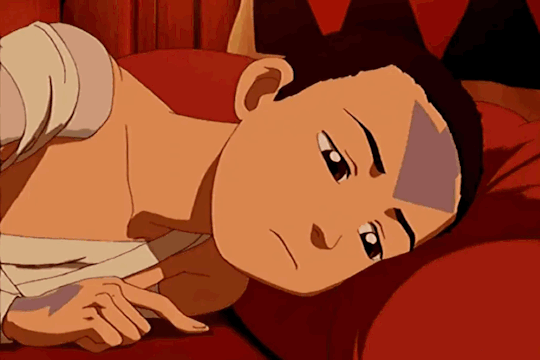
he supports Sokka when he voices insecurities, he is welcoming and friendly to Hakoda and even inquires about how Katara is feeling when he meets Hakoda, he sobs during the eclipse invasion because Katara and Sokka have to be separated from their father again and Aang blames himself for this defeat and is grief stricken because he is so upset they are losing their dad again (and he thinks it’s his fault)
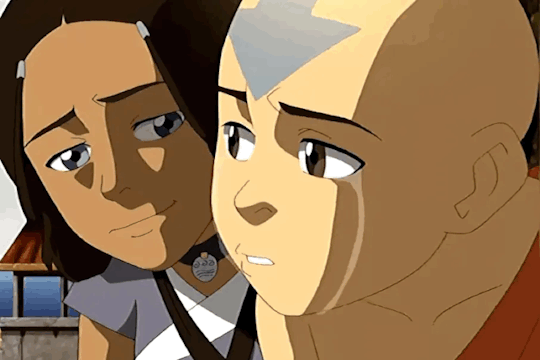
Why the actual fuck would Katara ever “choose” Zuko over Aang?
Katara was never deeply tied to Zuko. She always saw him as an enemy trying to take away the boy she loved. This is why she threatened to fucking kill him.
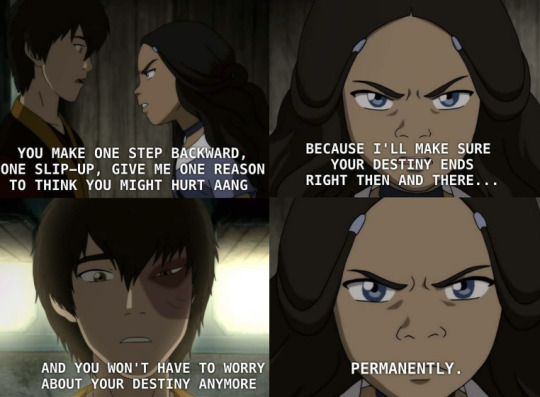
Zuko helped his sister murder Aang right in front of Katara’s eyes. It was canonically the darkest period of her life.
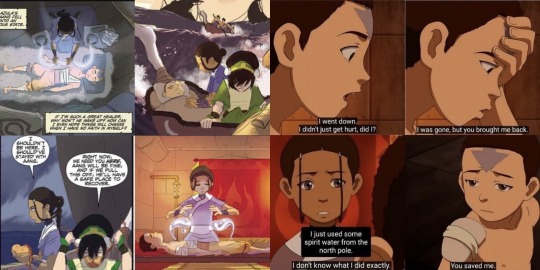
Katara’s anger and hatred toward Zuko is 100% justified. Of course, Zuko is a self absorbed ass, so he claims her anger isn’t justified and that she’s just projecting. Her anger toward him specifically had far more to do with what he did to Aang and far less to do with what the Fire nation and Zuko’s family did to her mother. Even still, she’s right to be angry about her mother’s murder too, and Zuko’s piece of shit family is responsible.
Why the fuck would Katara magically drop to her knees and suck Zuko’s dick? He’s literally a colonizer for over 2/3 of the show. He didn’t just have a passive role, he was an active player in the war and invaded the NWT with the FN as a means to capture Aang and take him back to his daddy, where Aang would have undoubtedly been tortured mercilessly and kept on the brink of death. He assaulted Katara during this and knocked her unconscious, he taunted her with shitty words and undermined her bending ability and threw some racial/classist remarks as well as some misogynistic ones her way.
When he eventually did get his shit together and join the group, he just used her mother’s death against her and Sokka because that’s all he ever did in regards to Katara and Sokka’s mother. He learned how she died, then had Sokka divulge trauma to then use said trauma to try and force Katara to forgive him by persuading her to go on a suicide mission of revenge and bloodlust. He also literally mocked Aang’s culture and genocided people to his face, when his family committed the genocide. Oh, and he also mocked Aang’s forgiveness despite begging on his damn hands and knees for that very forgiveness like 3 episodes prior.
And then at the end of the episode, Zuko states himself that he legit doesn’t understand Katara or what she needs in life. Cuz of course he doesn’t. He isn’t a survivor of genocide, he hasn’t suffered ethnic cleansing, he isn’t oppressed. For fucks sake, his mother isn’t even dead and he gets reunited with her a few years after the canon shows timeline. Everything Zuko loses, he has returned to him. His honor, his right to the throne, his mother.
But tell me again how Katara and Aang are a bad match when they are the only two who will ever truly understand the other
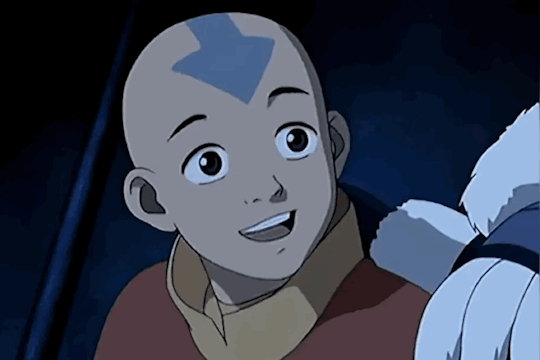
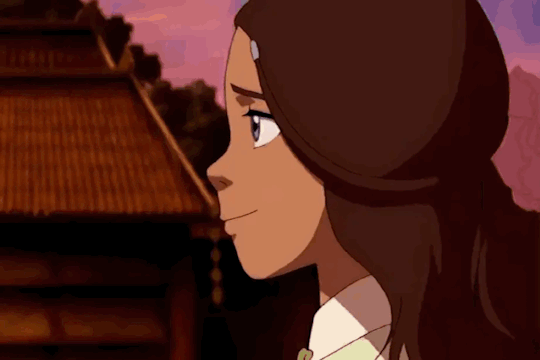
#I don’t hate Zuko but I’m sick of this fandom dickriding him at Aang and kataangs expense#kataang#pro kataang#anti zutara#avatar the last airbender#atla
99 notes
·
View notes
Text
Paradigm Time! - What is a Paradigm?
TL;DR: Paradigms are how you make sense of magic and how it fits into the world in your experiences. They aren't right or wrong and they often change!

Paradigm: a philosophical or theoretical framework of any kind
Note: There are a few different definitions of paradigm depending on the field you're talking about. In the case of magic, we are using the definition above.
Paradigms are essentially how you make sense of the world around you. In magic, these paradigms are ways in which someone understands magic, how it works, and how it is used in the world.
Other people have used words like “framework”, or “beliefs/belief system”. Whatever you call it is fine!
Paradigms can and often do change over time, maybe you used to believe “xyz”, but now you’re thinking more “abc”. This doesn't make everything that you did while you believed in “xyz” invalid, it just means you understand it differently now.
Since paradigms are basically belief systems, they are not factual and are not “right” or “wrong” they simply are. One person may disagree with another, who may disagree with someone else, who may have similar but slightly different experiences than another. More than anything else, paradigms are fluid.
Furthermore, paradigms are fluid not just within ourselves but within communities too!
Here’s an example:
Say everyone in x community generally agrees that crystals hold power.
However, some may believe that crystals only hold power once charged, like how a cup can only hold water once filled.
While others may believe there is an inherent power within the crystal. Others in turn might believe that some crystals hold power and others don’t.
Yet they all still believe the paradigm that crystals hold power.
Now let’s take a few paradigms about correspondences as another example.
In one witch’s paradigm, they might be used as ingredients that hold inherent power.
-> “I am using the magical properties inherent to basil to power my money jar.”
In another, the correspondences are spirits that you petition to help power the magical working.
-> “I am working with the spirit of basil and asking them to help with my money jar.”
In another, the correspondences are offerings that you give to a spirit that you’re petitioning.
-> “I am using basil as an offering to a spirit to help with my money jar.”
In yet another the correspondences are spirits that you don’t even need to petition, their very presence influences the spell.
-> “I’m using basil in this spell because the spirit of basil will help influence my money jar.”
Here are some other examples of paradigms:
Spirit-Working sorcery, where spirits are petitioned for aid, and the strength of workings tends to depend on the depth of the relationship developed with the spirit, and/or success in evoking them in that instance.
Thinking or focusing on your intent in your head is fine, writing it down is better, but speaking it aloud is best.
Energy is the battery of magic. Magic is the change caused by whatever you’re doing but energy is what powers that change, be it a spell, prayer, whatever.
Gods can be called upon and petitioned for help with a spell, but the relationship between the caster and the god will determine the strength of the spell or their willingness to help. Otherwise, you can try to appeal to them with offerings to make up for the lack of a relationship, though their help will still not be as strong as if there were a pre-existing relationship.
Inanimate objects do not have spirits, but animals, plants, fungi, and humans do.
Again, these are not universal paradigms, they are just examples. I honestly don't think there even is a universal paradigm when it comes to magic and witchcraft.
Thank you to @windvexer @friend-crow @stagkingswife and @rose-colored-tarot for your help in writing this post!
237 notes
·
View notes
Text
write what you want forever censorship is an insidious evil kill the cop in your head and so on but also. frankly. get comfortable with the idea that if you write about (a life experience) without any knowledge, insight, or research done into that thing, people with that experience irl won’t like what you’ve made and may even talk to their friends about how they don’t like it
putting this under a read more bc I don’t want it reblogged bc people on twt got mad at me for saying basically this but like listen. I’m not gonna harass individual authors bc they didn’t bother looking up an Indiana harvest calendar before writing a stranger things farm au. Or they clearly didn’t bother asking literally anyone with horse experience to beta their cowboy au. Obviously. Like who gives a shit, really. Do what you want. Your factually nonsensical farm/cowboy au doesn’t really affect my life. But I AM going to be annoyed if a fic is super popular or comes highly recommended and it gets a million details wrong that would have been easily caught by 10 minutes of googling, and that’s my right, too!!!! And also it’s your right!!! Kvetch in your friends’ DMs, it’s good for you
I’ve seen a few versions of the sentiment “I’m a hater because I love this thing and I want it to be better” floating around recently and that’s what it comes down to in the end. Fic can be really good. it doesn’t have to be “just fanfic.” I really really like when someone has obviously put in the extra effort and gone the extra mile to make a genuine art object. There are some big name fics I disproportionately dislike bc they have not bothered at all. One day I’ll be able to put all my thoughts together cohesively about this paradox of “do what you want forever but also take your audience seriously or so help me” but tbh I think it really comes down to the fact that I love the medium of fanfic and I want it to be good and when it’s not good in lazy ways it feels like disrespect to the audience, to me.
#sorry about the stream of consciousness#also this is an incomplete argument in what I think are obvious ways#so please interpret in good faith 🔫
41 notes
·
View notes
Text
by David M. Litman
Error #1: “Israeli air strikes on a camp sheltering displaced civilians…”
The Facts: In just the first nine words of the statement, the “experts” got two major facts objectively wrong.
First, there was one strike, not strikes plural, though according to the Israeli military the strike did involve two weapons.

The tragic deaths at Tel as-Sultan—180 meters away from the location of the strike—appear to have occurred due to unforeseen circumstances.
As the investigations continue, the most likely explanation emerging is that the strike ignited a nearby, unknown weapons cache, which set alight some of the shelters. The IDF has since shown aerial footage showing a rocket launcher located between the building struck and the shelters. Footage purportedly from the scene also supports this theory, showing what appear to be secondary explosions after the strike.
Error #2: “Reports emerging from the ground indicate that the strikes were indiscriminate and disproportionate…”
The Facts: Far from being indiscriminate, the strikes successfully targeted two senior Hamas terrorists, Yassin Rabia and Khaled Nagar. Far from being indiscriminate, “The strike was based on precise intelligence that indicated that these terrorists, who were responsible for orchestrating and executing terror attacks against Israelis, [and who] were meeting inside the specific structure” targeted. Furthermore, the precision munitions used were literally the “smallest the military’s jets can use” according to the IDF.
The claim about the strike being “disproportionate” is likewise contradicted by the evidence. Prior to the strike, the IDF surveilled the building and its surroundings and determined there was no significant civilian presence in the anticipated area of effect. The “experts” instead appear to be using an erroneous interpretation of the legal concept they claim to be experts on.
Proportionality is not a rule focused on the results of a strike, but rather on the decision-making before the strike is launched. The question is whether the anticipated civilian harm is disproportionate to the concrete military advantage to be gained. As explained by Lt. Col. Geoffrey Corn (ret.):
“In the context of hostilities, this is often translated into the ‘reasonable commander’ test: was the attack decision one that another reasonable commander, facing the same situation and with the same information available, would have also made? If so, the attack was lawful, even if the result turned out to contradict the expectation at the time it was launched. If not, the attack was unlawful. This is why the instinct to rely on ‘effects-based’ condemnations—to condemn an attack as a war crime based only on the civilian harm inflicted by the attack—is legally invalid.”
Error #3: “These barbaric attacks are a flagrant violation of international law.”
The Facts: See Errors 1 and 2. The authors are declaring a “violation of international law” based on inaccurate factual claims and erroneous interpretations of the law. It is worth pointing out, too, that these U.N. actors declared there was a violation based only on “reports,” without having engaged in any actual investigation or legal analysis. Worse, the authors omit entirely the legal responsibility of Hamas, which had embedded military targets in a civilian area near the shelters.
56 notes
·
View notes